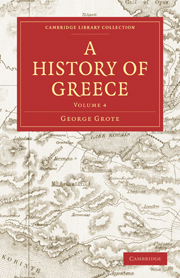Book contents
- Frontmatter
- Contents
- PART II CONTINUATION OF HISTORICAL GREECE
- CHAPTER XXV Illyrians, Macedonians, Pæonians
- CHAPTER XXVI Thracians and Greek Colonies in Thrace
- CHAPTER XXVII Kyrênê.—Barka.—Hesperides
- CHAPTER XXVIII Pan-Hellenic Festivals—Olympic, Pythian, Nemean and Isthmian
- CHAPTER XXIX Lyric Poetry.—The Seven Wise Men
- CHAPTER XXX Grecian Affairs during the Government of Peisistratus and his Sons at Athens
- CHAPTER XXXI Grecian Affairs after the Expulsion of the Peisistratids.—Revolution of Kleisthenês and Establishment of Democracy at Athens
- CHAPTER XXXII Rise of the Persian empire.—Cyrus
- CHAPTER XXXIII Growth of the Persian Empire
- CHAPTER XXXIV Dêmokêdês.—Darius invades Scythia
- CHAPTER XXXV Ionic Revolt
- CHAPTER XXXVI From Ionic Revolt to Battle of Marathon
- CHAPTER XXXVII Ionic Philosophers.—Pythagoras.—Kroton and Sybaris
- Titles in the Series
CHAPTER XXXI - Grecian Affairs after the Expulsion of the Peisistratids.—Revolution of Kleisthenês and Establishment of Democracy at Athens
Published online by Cambridge University Press: 29 August 2010
- Frontmatter
- Contents
- PART II CONTINUATION OF HISTORICAL GREECE
- CHAPTER XXV Illyrians, Macedonians, Pæonians
- CHAPTER XXVI Thracians and Greek Colonies in Thrace
- CHAPTER XXVII Kyrênê.—Barka.—Hesperides
- CHAPTER XXVIII Pan-Hellenic Festivals—Olympic, Pythian, Nemean and Isthmian
- CHAPTER XXIX Lyric Poetry.—The Seven Wise Men
- CHAPTER XXX Grecian Affairs during the Government of Peisistratus and his Sons at Athens
- CHAPTER XXXI Grecian Affairs after the Expulsion of the Peisistratids.—Revolution of Kleisthenês and Establishment of Democracy at Athens
- CHAPTER XXXII Rise of the Persian empire.—Cyrus
- CHAPTER XXXIII Growth of the Persian Empire
- CHAPTER XXXIV Dêmokêdês.—Darius invades Scythia
- CHAPTER XXXV Ionic Revolt
- CHAPTER XXXVI From Ionic Revolt to Battle of Marathon
- CHAPTER XXXVII Ionic Philosophers.—Pythagoras.—Kroton and Sybaris
- Titles in the Series
Summary
With Hippias disappeared the mercenary Thracian garrison, upon which he and his father before him had leaned for defence as well as for enforcement of authority; and Kleomenês with his Lacedæmonian forces retired also, after staying only long enough to establish a personal friendship, productive subsequently of important consequences, between the Spartan king and the Athenian Isagoras. The Athenians were thus left to themselves, without any foreign interference to constrain them in their political arrangements.
It has been mentioned in the preceding chapter, that the Peisistratids had for the most part respected the forms of the Solonian constitution: the nine archons, and the probouleutic or preconsidering Senate of Four Hundred (both annually changed), still continued to subsist, together with occasional meetings of the people—or rather of such portion of the people as was comprised in the gentes, phratries, and four Ionic tribes. The timocratic classification of Solon (or quadruple scale of income and admeasurement of political franchises according to it) also continued to subsist—but all within the tether and subservient to the purposes of the ruling family, who always kept one of their number as real master, among the chief administrators, and always retained possession of the acropolis as well as of the mercenary force.
- Type
- Chapter
- Information
- A History of Greece , pp. 168 - 242Publisher: Cambridge University PressPrint publication year: 2010First published in: 1847



